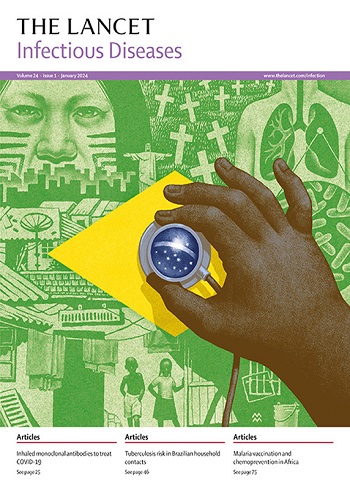Fiocruz Bahia study on tuberculosis featured in international journal
25/01/2024
Fiocruz Bahia
 Developed by researchers from Fiocruz Bahia's Center for Data and Knowledge Integration for Health (Cidacs), the article Incidence and risk factors of tuberculosis among 420,854 household contacts of patients with tuberculosis in the 100 Million Brazilian Cohort (2004-18): a cohort study is the cover story of the January issue of the journal The Lancet Infectious Diseases. The study describes a high incidence of tuberculosis among household contacts, i.e. people who live in the same household as a person who has previously been diagnosed with the disease. This incidence of tuberculosis among household contacts was 16 times higher than the incidence of tuberculosis in the general population of the 100 Million Brazilian Cohort, from the "Cadastro Único" (Sole Register, in a free translation) data used as the database for this study. A higher risk of becoming ill with tuberculosis was also found among contacts exposed to a family member under five years of age, who had been diagnosed with pulmonary tuberculosis, or for those contacts who declared themselves to be black, brown, indigenous or who lived in precarious housing.
Developed by researchers from Fiocruz Bahia's Center for Data and Knowledge Integration for Health (Cidacs), the article Incidence and risk factors of tuberculosis among 420,854 household contacts of patients with tuberculosis in the 100 Million Brazilian Cohort (2004-18): a cohort study is the cover story of the January issue of the journal The Lancet Infectious Diseases. The study describes a high incidence of tuberculosis among household contacts, i.e. people who live in the same household as a person who has previously been diagnosed with the disease. This incidence of tuberculosis among household contacts was 16 times higher than the incidence of tuberculosis in the general population of the 100 Million Brazilian Cohort, from the "Cadastro Único" (Sole Register, in a free translation) data used as the database for this study. A higher risk of becoming ill with tuberculosis was also found among contacts exposed to a family member under five years of age, who had been diagnosed with pulmonary tuberculosis, or for those contacts who declared themselves to be black, brown, indigenous or who lived in precarious housing.
For Julia Pescarini, coordinator of the study, the publication of the article in a journal such as Lancet ID shows the recognition of the work produced and the relevance of the research. According to Pescarini, the publication has a wide reach and is read by health professionals and managers in the field of infectious diseases, such as tuberculosis, all over the world. "Despite the widespread information about tuberculosis and its link to poverty, efforts to reduce its transmission among the poorest and minority populations are still scarce, and thus publishing in the Lancet also means increasing the reach of our research and maximizing its impact on disease control strategies," explains the coordinator.
Pescarini also highlights the publication process as an important factor in increasing the scope of research findings. For an article to be published in Lancet ID it goes through extensive peer reviews, showing that work and research in Brazil, in general, has the potential to carry out applied science of exceptional quality to answer research questions of importance not only for Brazil but for the world as well.
"Thus, the publication in Lancet ID shows, using robust methods and an unprecedented database, the greater transmission of TB between contacts of these groups," she said. According to Priscila Scaff, first author of the article, the study reinforces the vulnerability of household contacts to tuberculosis, especially for people living in unfavorable social conditions.
"That household contacts are at high risk of becoming ill with tuberculosis was already known, but this study provides details on how this occurs in Brazil's most economically vulnerable population. Our results highlight the importance of public policies to combat social inequalities, of strengthening and expanding the Family Health Strategy, and of preventive treatment for tuberculosis," she said.
Cidacs has contributed to the production of scientific knowledge through studies that help and support decision-making in public policies for the benefit of society. In its seven years of operation, the Center has distinguished itself with articles published in important magazines and scientific journals.




